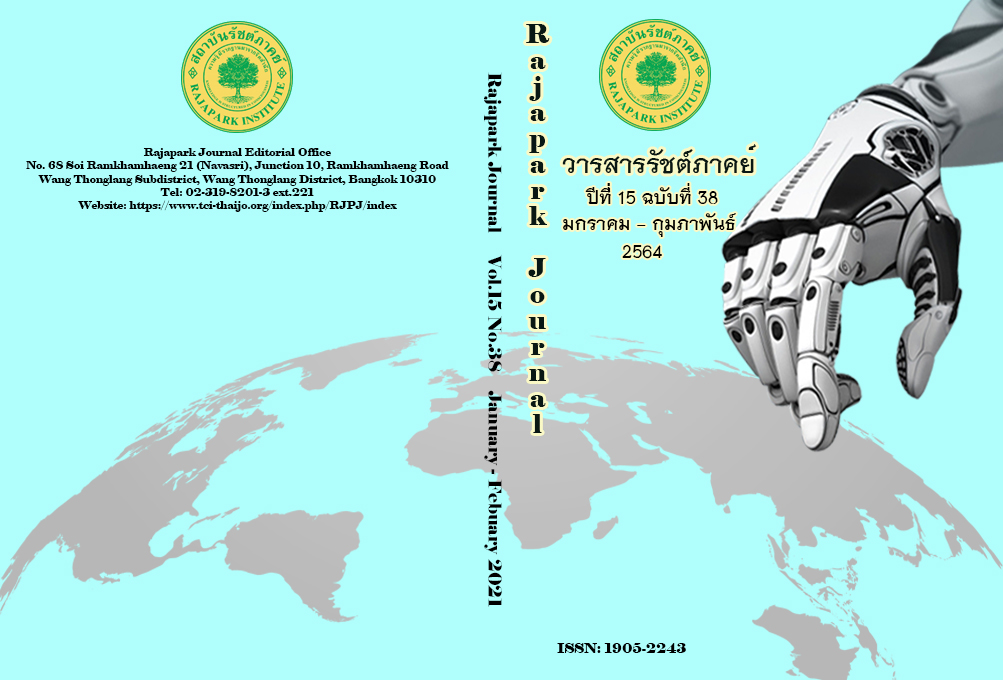Development of International Program Management for Schools in Thailand
Main Article Content
Abstract
International programs should be well-managed and efficiently operated because they develop potentially global citizens with thinking, communication, technical skills, and understanding of social and cultural diversity of others. The objectives of this research were to study international program management from the sampled countries: Australia, New Zealand, Japan, Hong Kong, and Singapore, and to develop and evaluate components of international program management for schools in Thailand. The research procedures commenced with a review of the international program policy management from the five sampled countries, followed by the synthesis of the data, conceptual framework development, and evaluation with soliciting thirteen experts’ opinions. The findings indicate that mission, tuition fees, and curriculum should be set by the original owner of the International Program. Authorization should be carried out with the cooperation of the original owner of the International Program and the Ministry of Education. Evaluation and quality assurance should be regulated by schools that offer the international program and the original owner of the International Program. Schools that offer the International Program should be responsible for teacher employment. Mission, teacher employment, and curriculum should be determined by schools that offer the Bilingual Program. Authorization should be carried out by the Ministry of Education. Tuition fees and quality assurance should be regulated by the Ministry of Education and schools that offer the Bilingual Program, while evaluation should be undertaken by schools that offer the Bilingual Program and the Ministry of Education.
Article Details
Views and opinions appearing in the Journal it is the responsibility of the author of the article, and does not constitute the view and responsibility of the editorial team.
References
Bell-Rose, S. (2007). Three Expert Perspectives: The Importance of International Education. Retrieved July 10, 2013, from https://www.edutopia.org/perspectives-international-education
Buadee, N. (2007). Factors Affecting Effectiveness Management According to Opinions of the Responsible Person in Managing a Bilingual School Project. Master of Education Thesis. Phranakhon Rajabhat University.
Chitsuthipakorn, T. (2004). The Development of Strategic Management for International Programs of Thai Higher Education Institutions. Ph.D. Education (Higher Education). Graduate School, Chulalongkorn University.
Chongdarakul, W. (2013). Strategies for the Development of English Language Education to Support Entering The ASEAN Community. Retrieved September 13, 2013, from www.phetchabun.go.th.../1377788186_wwsnta3t.pp
Chulavachana, T. J. (2012). Competitiveness: Education Hub? Thailand & Singapore neck to neck for the American market (Up-Dated). Retrieved July 9, 2013, from https://thaiintelligentnews.wordpress.com/2012/10/13/ competitiveness-asean-education-hub-thailand-singapore-neck-to-neck-for-the-american-market/
Education Bureau, The Government of the Hong Kong Special Administrative Region. (2009). Enriching Our Language Environment Realizing Our Vision, Fine-tuning of Medium of Instruction for Secondary Schools. Retrieved July 18, 2017, from https://www.edb.gov.hk/attachment /en/student-parents/ncs-students/about-ncs-students/moi%20booklet-eng-17apr2010.pdf
Government of Manitoba. (2017). International Education. Retrieved May 8, 2017, from http://www.gov.mb.ca/ie/about/benefits.html
Jack Van de Water. (2005). “Looking at the Fundamentals of International Education Administration”, Presentation: International Dimensions of Higher Education in Thailand. Organized by The Higher Education Commission, February 21, 2005, Prince Palace Hotel, Thailand.
Nguyen, D. T., Ng, D., & Yap, P. S. (2017). Instructional Leadership Structure in Singapore: A Co-Existence of Hierarchy and Hierarchy. Journal of Educational Administration, 55(2), 147-167. https://doi.org/10.1108/JEA-05-2016-0060
Nuffic. (2015). Education System Japan. Retrieved July 19, 2017, from https://www.nuffic.nl/en/publications/ education-system-japan/
Power, C. N. (2000). Global Trends in Education. International Education Journal, 1(3), 152-163.
Skulphanarak, C., & Chenaksara, N. (2010). A Model of Thailand English Program School Administration. Journal of Educational Administration, Silpakorn University, 1(1), 142-150.
Wait, J. (2008). Why Do You Feel International Education is Important. Retrieved July 10, 2013, from
http://blog.nafsa.org/2008/11/17/why-do-you-feel-international-education-is-important/
Wit, H. (2011). Internationalization of Higher Education: Nine Misconceptions. Retrieved July 11, 2013, from http://www.eurashe.eu/wp-content/uploads/2011/10/intlztion-Misconceptions.pdf
Woolf, M. (2002). Harmony and Dissonance in International Education: The Limits of Globalization. Journal of Studies in International Education, 16(1), 5-15.


